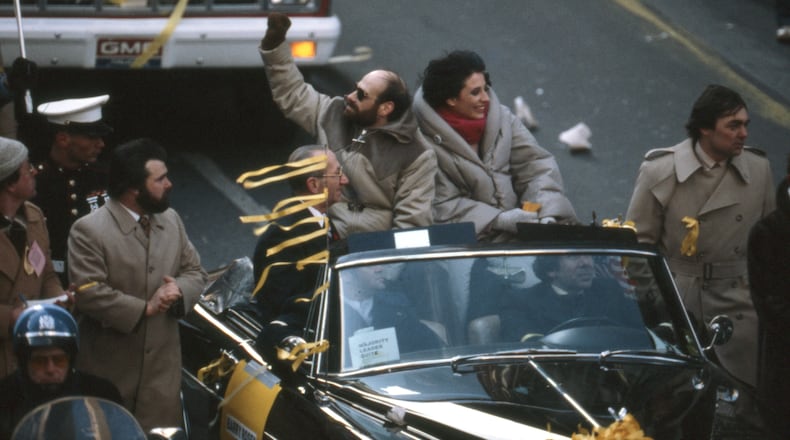Barry Rosen remembers Nov. 4, 1979 like it was yesterday.
Rosen, at the time the press attaché for the United States Embassy in Iran, figures prominently in a new documentary about the months that he and 65 others were taken hostage as part of the Iranian Revolution.
Credit: Associated Press
Credit: Associated Press
It was an event that shook the presidency of Jimmy Carter and shifted Middle Eastern politics and culture in ways that are still being felt today.
“Before I knew it, 15 to 20 people are pounding on my door,” Rosen says in the documentary about the very moment he was taken. “They just barged through. There I am facing these people. I said, ‘Who are you?’ And (one of them) says, ‘I’m a part of the Students Following the Line of the Imam. You’re in the nest of spies. You are part of U.S. imperialism, and you’re the corruptors of the Earth. You are our prisoner.’”
Rosen, along with his wife, Barbara, filmmaker Robert Stone and Col. James Roberts, who was part of the hostage rescue team, will be in Atlanta at the Jimmy Carter Presidential Library and Museum at 7 p.m. on Wednesday to discuss “Taken Hostage.” The two-part PBS American Experience and Georgia Public Broadcasting documentary tells the story through six Americans who lived through it directly.
Credit: Courtesy of National Archives and Records Administration
Credit: Courtesy of National Archives and Records Administration
By 1978, resentment toward the American-backed Shah of Iran had reached a breaking point, unleashing the Iranian Revolution and sending the Shah into exile.
Fifty-two of the original 66 hostages were held for 444 days and released on Jan. 20, 1981, just minutes after Ronald Reagan was sworn in as president, succeeding Carter.
Credit: File
Credit: File
“It didn’t begin with Carter. It had roots in the Truman and Eisenhower administrations to overthrow the government and install the Shah in Iran,” Stone told The Atlanta Journal-Constitution. “Carter just happened to be president when this whole thing blew up.”
Iran has returned to global headlines in recent weeks, amid what is considered the most serious challenge to that country’s authorities in decades. Citizens have taken to the streets to protest the death of Mahsa Amini, a 22-year-old woman who died in police custody for allegedly violating Iran’s strict rules requiring women to cover their hair with a hijab, or headscarf.
“All these years, women and youth have been denied simple dignity,” Rosen said. “This is a movement to reclaim their lives.”
For Rosen, who is retired and living in New York City, reclaiming his own life has been a long journey. He said being in the documentary gave him a chance to tell a fuller story than previous conversations or news snippets.
Credit: Courtesy of Frankie Alduino
Credit: Courtesy of Frankie Alduino
“I was given a great deal of time to say what needed to be said about the Revolution and our captivity,” Rosen said. “I wouldn’t say it brought out trauma, but it was uncomfortable. But this is an important time to say what needed to be said about Iran.”
The documentary airs over two nights on PBS — including GPB, WABE and The World Channel — on Nov. 14 and 15 at 9 p.m.
About the Author
Keep Reading
The Latest
Featured







